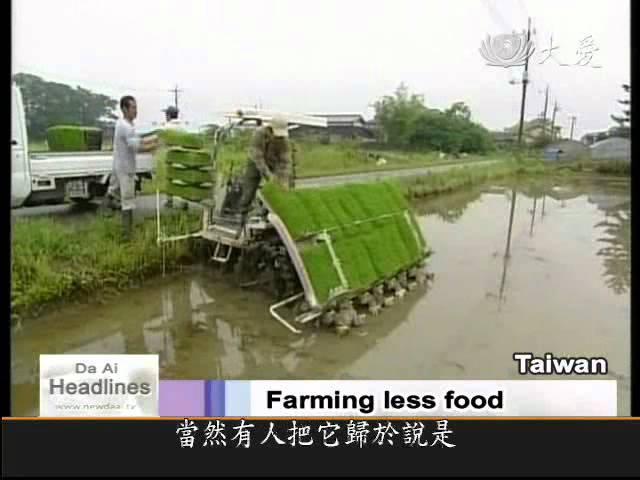
DaAiTV DaAiHeadline 20110525 Food self-sufficiency.wmv
In recent years, we've seen climate change, global warming and the rising cost of raw materials put upward pressure on the price of food. In 2008, the Economist magazine described the food crisis as a "silent tsunami". Worried about that looming threat, most countries are looking to decrease their reliance on imports, and increase their food self-sufficiency. But Taiwan is moving in the opposite direction. Once built on agriculture, currently in Taiwan only 32 percent of food is locally produced. In the first of a new series of feature reports, we examine Taiwan's food policy.
( From rice growers, to bread eaters )
At one time, Taiwan was a world-leading food producer.Before 1968, the country was self-sufficient, and even produced a surplus. But since then, the self-sufficiency rate has steadily dropped.
NTU Department of Agriculture, Prof. Lin Guoqing
"We used to be up to nearly 100 percent, or over 100. From that very high self-sufficiency rate in the world, we dropped to 32 percent, which is also a world first!"
Taiwan Council of Agriculture, Minister Chen Wende
"In 2010, we imported 2.54 million tons of corn, 1.1 million tons of wheat, 500,000 tons of sugar. The total cost of these imports was nearly 120 billion NT dollars."
( Farming less food )
Compared to Japan, which only has one annual harvest, tropical Taiwan enjoys two harvests a year. The climate is perfect for farming, yet Taiwan's self-sufficiency rate is bottom of the developed country list.
NTU Department of Agriculture, Prof. Lin Guoqing
"Of course some people say it's because of better income, and Westernization of consumer behavior. That's partly true. But you can't blame it all on that. The most important reason is agriculture policy."
( Government set-aside policy )
Ten years ago, Taiwan joined the WTO, opening up its market to some agricultural products. Over 900,000 hectares of farmland was turned over to other uses, or set aside.
Council of Agriculture, Minister Chen Wende
"Back in the 1980s, one person ate 98 kilos of rice a year. Now it's only 48 kilos. That forces us to set-aside and convert land. Some people criticize us for not properly using farmland, but you have to see it in context."
NTU Department of Agriculture, Prof. Lin Guoqing
"In the past the system of set-aside, meant if you planted land, the government wouldn't give you money. But now, if you were growing vegetables, but not anymore, they give you 45,000. That's a weird policy. We should turn it around. If you don't plant, I won't subsidize you. If you plant, I'll pay you."
( Rural revitalization )
If the price of food plummets, the experts suggest a 'direct payment' mechanism to compensate farmers. Will this mean fresh, local, cheap food, and countryside recovery?
Council of Agriculture, Minister Chen Wende
"If everyone helps, rice consumption will increase, and we can revitalize. An increase of 1 kilo would revitalize 5,600 hectares."
( Food security )
lobal warming, armed conflict and other issues have an immediate impact on food trade. Perhaps if countries like Taiwan properly use their natural resources, and become more self-sufficient, true food security could be achieved.
( From rice growers, to bread eaters )
At one time, Taiwan was a world-leading food producer.Before 1968, the country was self-sufficient, and even produced a surplus. But since then, the self-sufficiency rate has steadily dropped.
NTU Department of Agriculture, Prof. Lin Guoqing
"We used to be up to nearly 100 percent, or over 100. From that very high self-sufficiency rate in the world, we dropped to 32 percent, which is also a world first!"
Taiwan Council of Agriculture, Minister Chen Wende
"In 2010, we imported 2.54 million tons of corn, 1.1 million tons of wheat, 500,000 tons of sugar. The total cost of these imports was nearly 120 billion NT dollars."
( Farming less food )
Compared to Japan, which only has one annual harvest, tropical Taiwan enjoys two harvests a year. The climate is perfect for farming, yet Taiwan's self-sufficiency rate is bottom of the developed country list.
NTU Department of Agriculture, Prof. Lin Guoqing
"Of course some people say it's because of better income, and Westernization of consumer behavior. That's partly true. But you can't blame it all on that. The most important reason is agriculture policy."
( Government set-aside policy )
Ten years ago, Taiwan joined the WTO, opening up its market to some agricultural products. Over 900,000 hectares of farmland was turned over to other uses, or set aside.
Council of Agriculture, Minister Chen Wende
"Back in the 1980s, one person ate 98 kilos of rice a year. Now it's only 48 kilos. That forces us to set-aside and convert land. Some people criticize us for not properly using farmland, but you have to see it in context."
NTU Department of Agriculture, Prof. Lin Guoqing
"In the past the system of set-aside, meant if you planted land, the government wouldn't give you money. But now, if you were growing vegetables, but not anymore, they give you 45,000. That's a weird policy. We should turn it around. If you don't plant, I won't subsidize you. If you plant, I'll pay you."
( Rural revitalization )
If the price of food plummets, the experts suggest a 'direct payment' mechanism to compensate farmers. Will this mean fresh, local, cheap food, and countryside recovery?
Council of Agriculture, Minister Chen Wende
"If everyone helps, rice consumption will increase, and we can revitalize. An increase of 1 kilo would revitalize 5,600 hectares."
( Food security )
lobal warming, armed conflict and other issues have an immediate impact on food trade. Perhaps if countries like Taiwan properly use their natural resources, and become more self-sufficient, true food security could be achieved.
Тэги:
#Prof. #Lin #Guoqing #Minister #Chen #Wende #NTUКомментарии:
DaAiTV DaAiHeadline 20110525 Food self-sufficiency.wmv
大愛電視 Tzu Chi DaAiVideo
Looloo Kids - Dierlijke Geluiden Liedje en Leuk kinderfilmpje
Kids TV Netherlands - Liedjes voor Peuters
OpenSSH Made Easy: The Ultimate Step-by-Step Tutorial
Learn Linux TV
The Hater's Guide to the 2023 Indy 500
Elly Productions
22 Şubat 2025
Türkan Turan
Профессиональная чистка зубов в стоматологии — виды, цена, как часто нужно проходить?
Олег Конников Dental concept
سستم بنز لخدمات السيارات جدة كيلو 14
System Benz سستم بنز
Ганчинабону - Ошекатам
OLAMI SAROYАNDAHO
GLOCK 19X: Was zeichnet die Zivilversion der GLOCK 19 MHS aus?
all4shooters.de


























